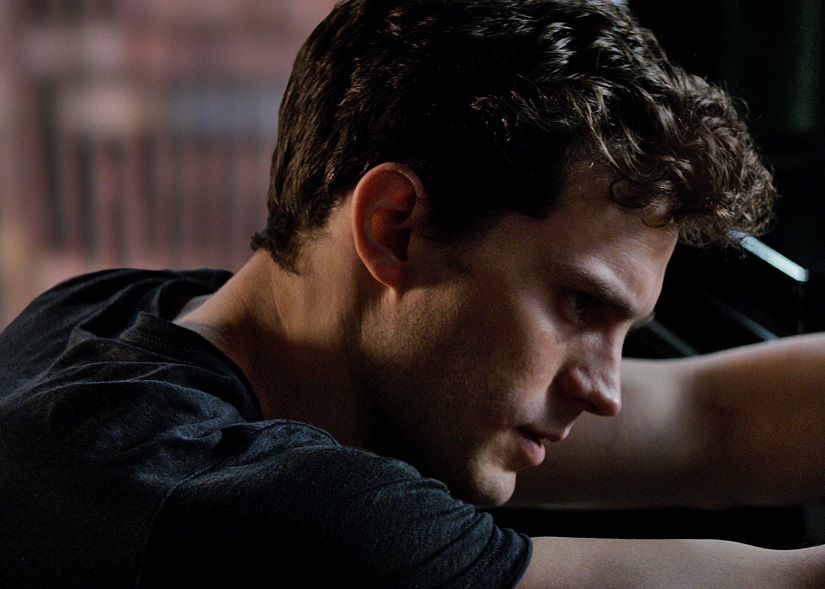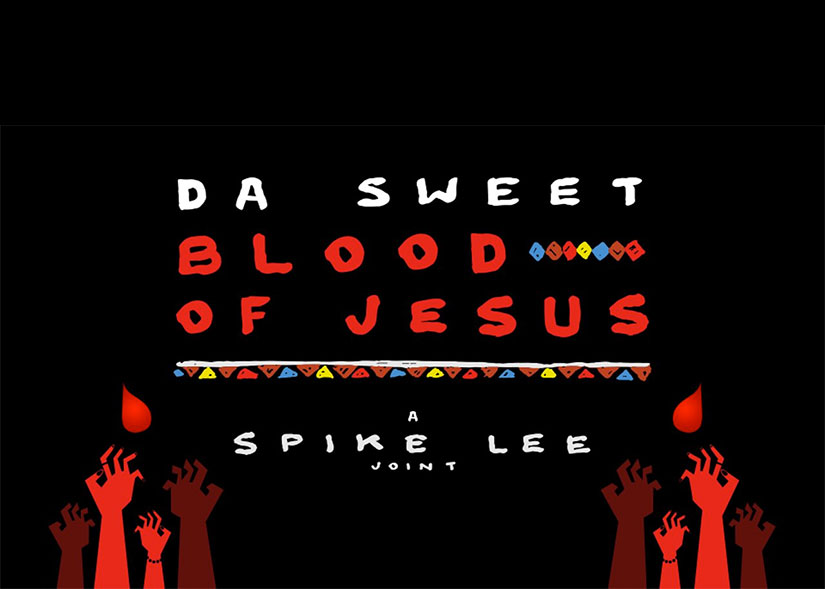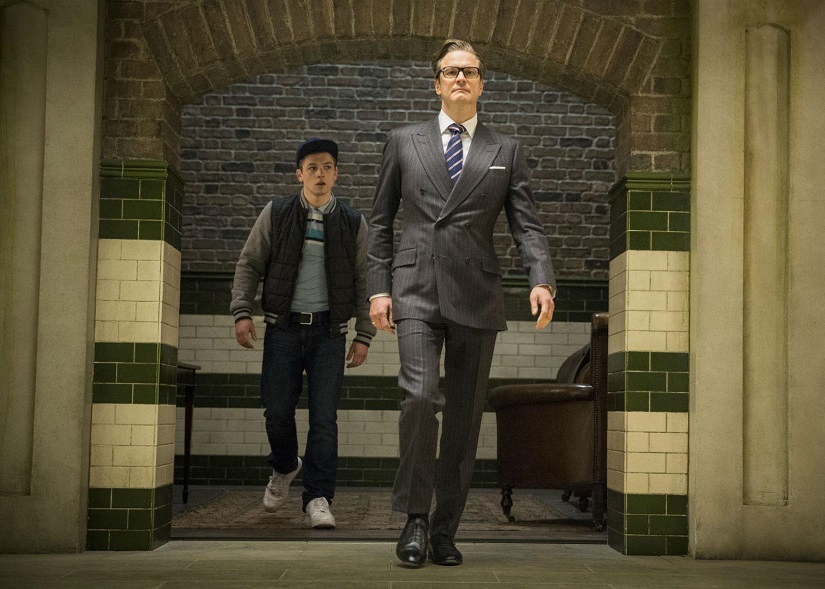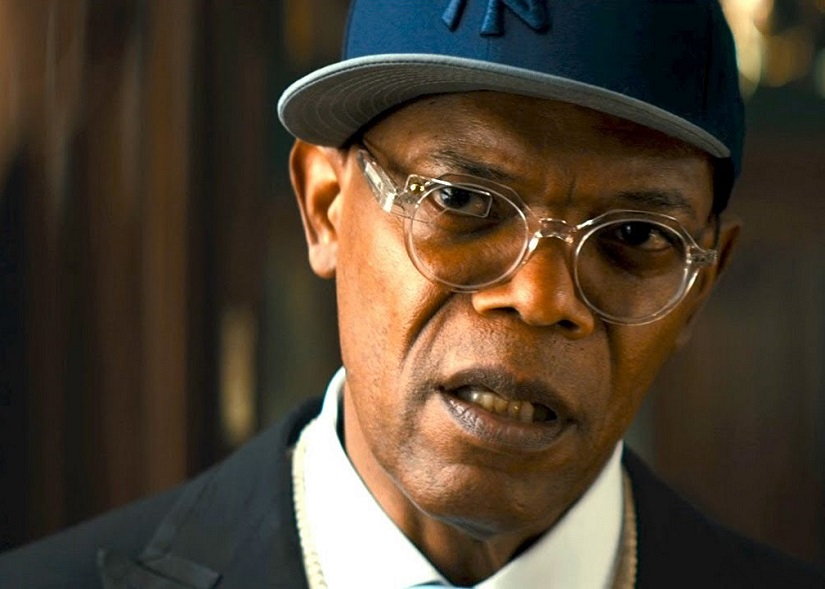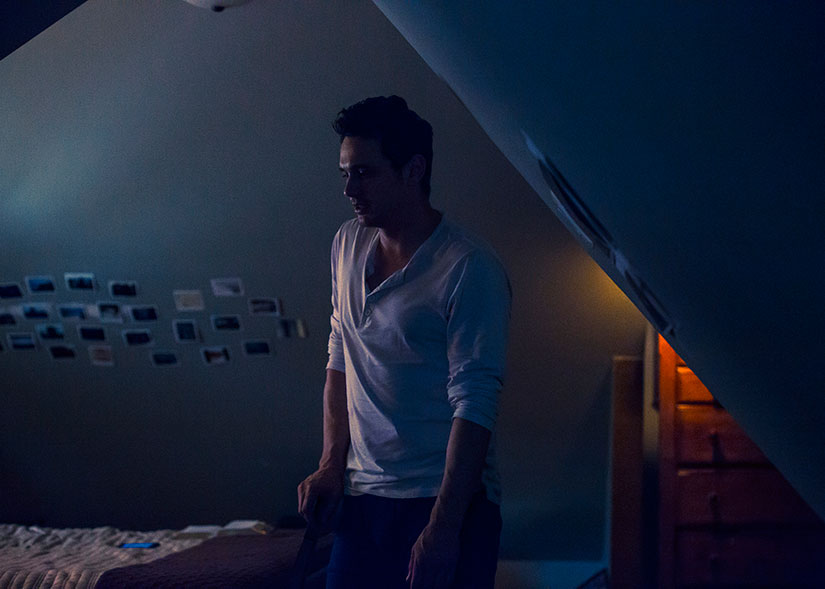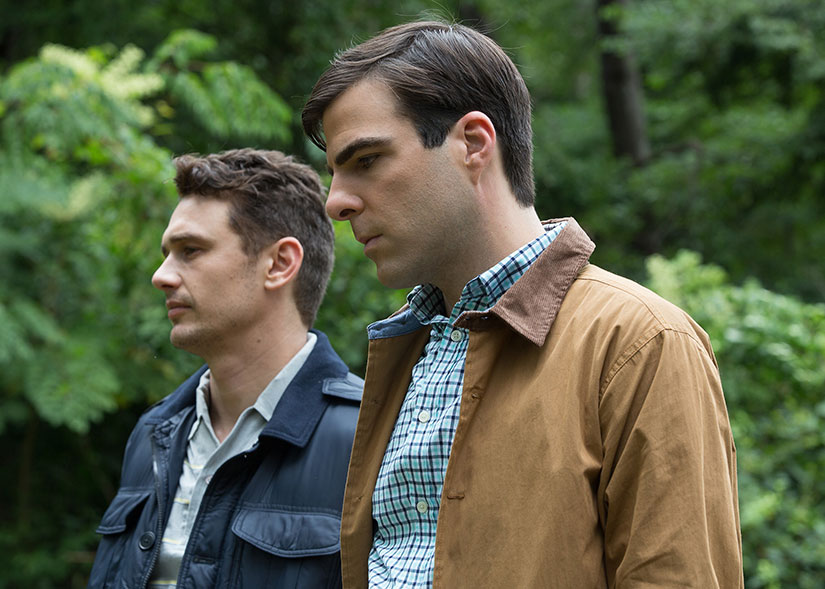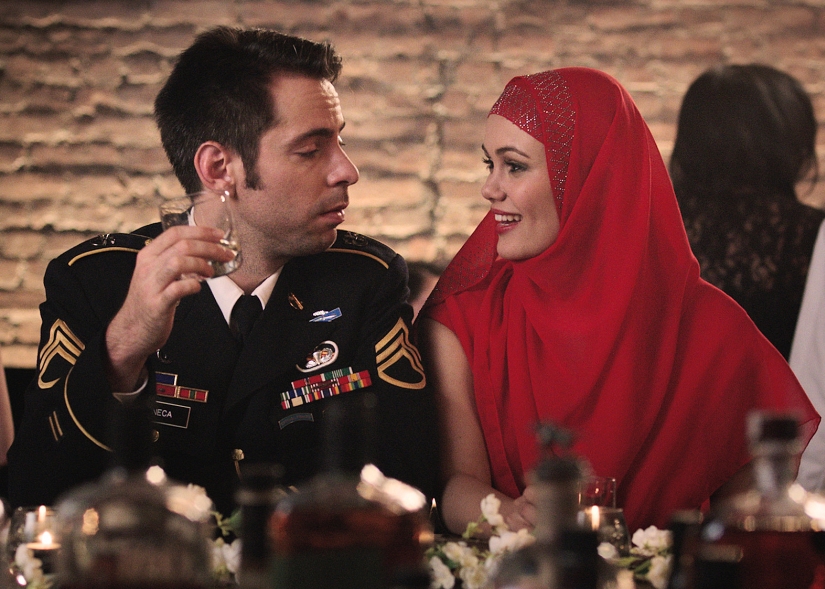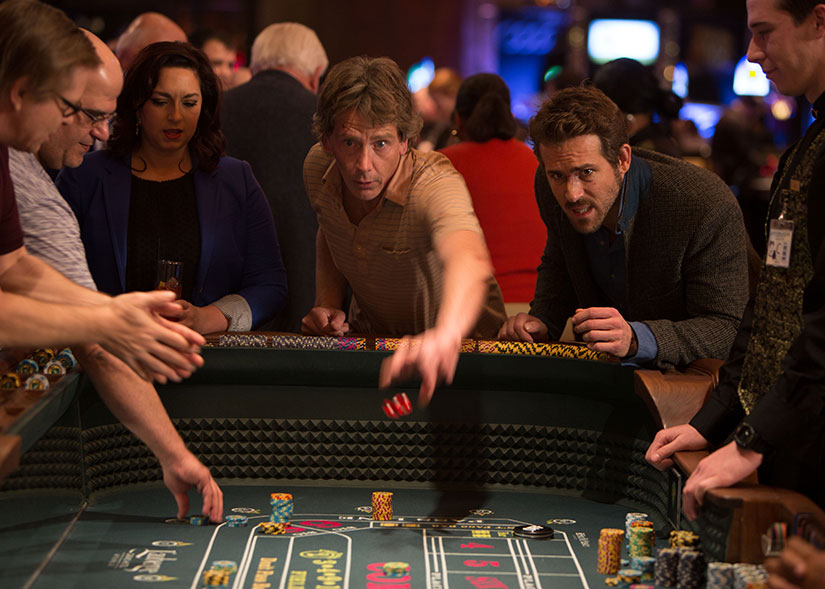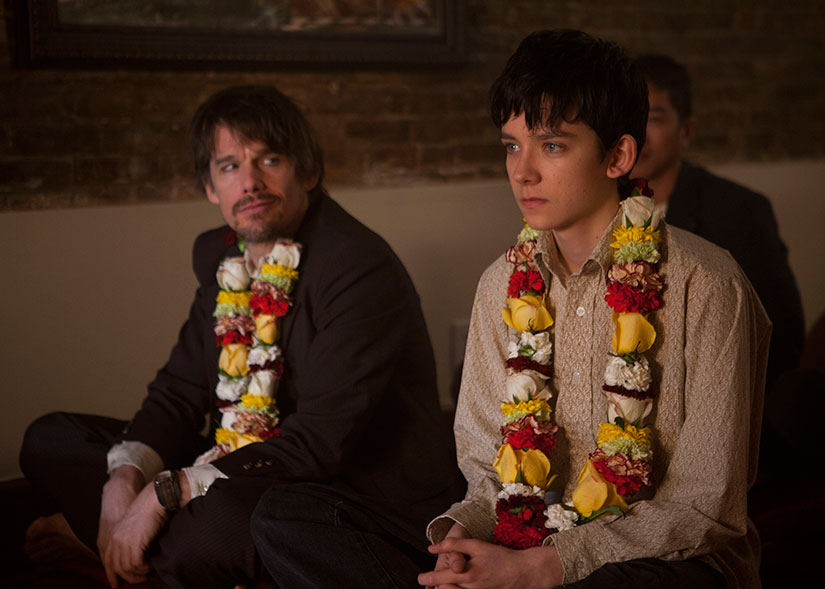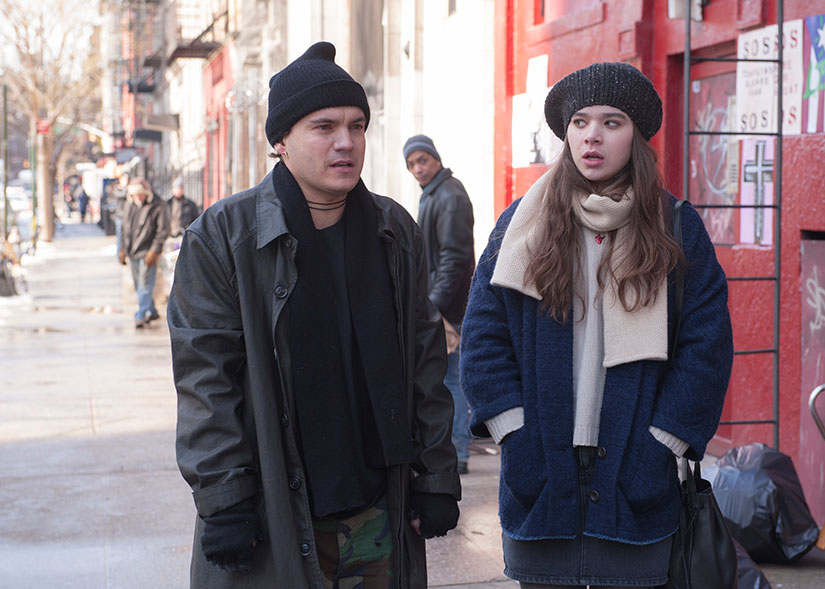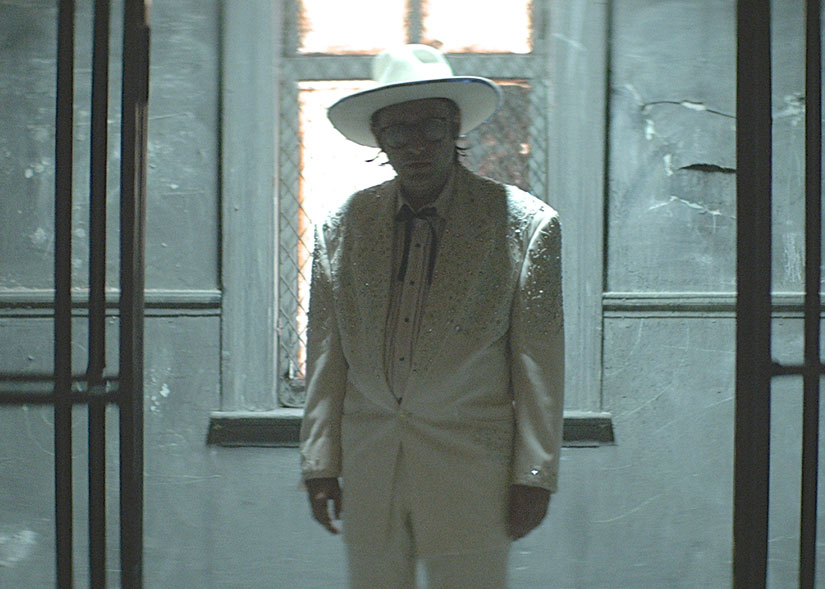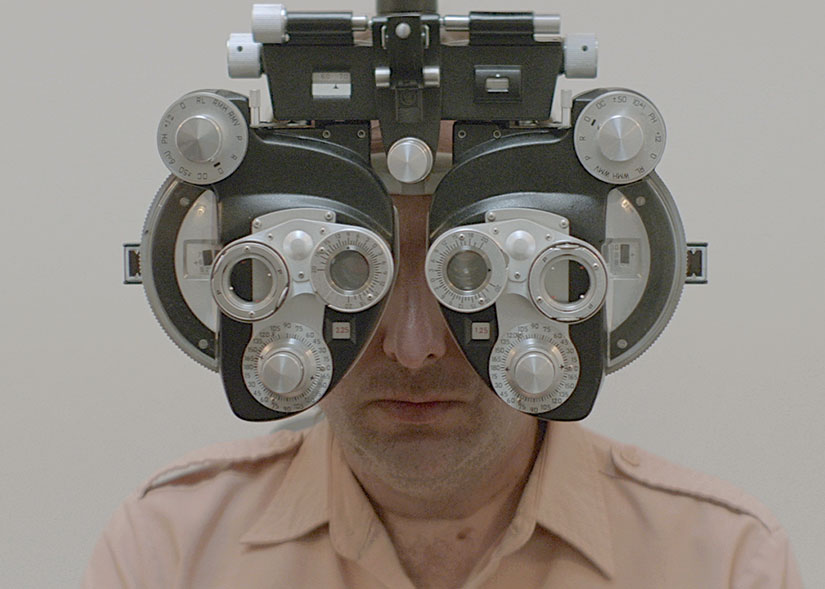[Review] Fifty Shades of Grey
I knew very little about Fifty Shades Of Grey going into the movie, other than it being about BDSM and that the book's prose was the subject of widespread derision. The latter point always seemed an odd one to me: reading erotica for the prose sounds a bit like watching porn for the art direction. It exemplifies an attitude of snobbishness which continues to permeate criticism of the arts in all media. By most accounts, plenty of women found the book an entirely pleasurable experience. It must have been doing something right.
As you've probably worked out by now, that kind of introduction is only heading in one direction, so I'll just out and say it: look past the upturned noses and Fifty Shades Of Grey is not only a perfectly decent movie, but wittier and more subversive than many would have anticipated.
[youtube id="SfZWFDs0LxA"]
Fifty Shades Of Grey
Director: Sam Taylor-Johnson
Rating: R
Release Date: February 14, 2015
Were you expecting a bodice-ripping, dick-swinging, ass-pounding, ball-squeezing, face-sitting, vaginal-fisting extravangza, Fifty Shades is not it. The fact the movie made it to cinemas should have told you that much, and besides, in the event of disappointment, there's always YouPorn. Though there's a cursory amount of whipping, some tied hands and quite a bit of moaning, director Sam Taylor-Johnson consciously shifts away from anything resembling exploitation. It is best described as a sex-themed character drama, more concerned with subverting screen representations of male and female sexuality, when they exist at all, than utilising them for blunt titillation. There's a reasonable amount of sex, but artfully shot and with one eye clearly aimed at meeting the requirements of the R rating. Only Anastasia shows anything provocative, though given how close a few of cuts are to Christian's crotch, the feeling pervades that this is more the result of institutional sexism at the certification boards rather than willing self-censorship.
Even so, the flashes of pubic hair from both lead characters feels satisfyingly liberated compared to the sterility afflicting your average blockbuster. The imbalance in what the movie is allowed to show does have the side-effect of slightly shifting the movie's gaze towards Anastasia rather than Christian, where it should be, but this is nevertheless the rare movie which emphasizes female pleasure first and foremost. True, it's mostly through bitten lips and sensual gasps, but remains a heck of a lot better than anything else Hollywood has provided in recent decades. Fears about Anastasia's position as the submissive in the relationship are also ill-founded: consent is not only a key concern for Christian, but to such an extent that it almost circles around to satirising the challenges of tackling that topic in real-life. Ana's distaste for the consent contract which Christian is desperate for her to sign can't help but nudge, if accidentally, towards the inherent hypocrises of 'yes means yes' laws.
The fact Fifty Shades is the rare Hollywood movie where the entire creative team is female makes its even-handed treatment of gender and sexual expectations all the more poignant. This is a movie where a woman inhibited by her sexual shame meets a man imprisoned by his and through pushing the limits of their sexual and emotional horizons, begin unearthing each other's buried humanity. Dakota Johnson is a revelation as the meek but quietly intelligent Ana, bringing considerable pathos and underlying strength to the role as the character gradually learns to assert herself in bringing her relationship with Christian onto her terms even while acting as his submissive. The movie may offer the tamest possible representation of BDSM, but understands the seemingly contradictory principles at its core (pleasure through pain, liberation through abandonment of control) and neatly weaves them into its character arcs. It may not be particularly subtle, but it works.
As Christian, Jamie Dornan struggles to make much of an impact beyond, to judge by the panting admiration of the girls sitting behind me, the not inconsiderable appeal of his toned body. Christian is tormented by his obsession with control and how Ana challenges his refusal to engage with women on anything other than the terms of a contractually defined relationship. Dornan is a little too baby-faced and young to authentically sell the character's depth of sadness and anger, leading to his brooding seeming a little too practiced and pouting to make his inner turmoil completely believable. Were the movie more geared towards the mostly implied eroticism, his aesthetic appeal would be more than enough. With emphasis instead placed on the character drama, his struggles make Christian more frustrating than enigmatic and restrain - and not in the fun way - his chemistry with Dakota Johnson.
Also frustrating is the movie's status as the first entry in a planned trilogy. After a lively opening, the pace drags considerably during the middle act with a few too many repeated 'why don't you let me in' conversations and family drama which emphasizes Ana's homespun nature but gets mighty tedious while doing so. The cliffhanger that concludes the movie, while an important moment for Ana, feels like it should have arrived at roughly the halfway or three-quarter point rather than being spun out into an entirely unsatisfactory ending (reaction of the girls behind me: "What? Is that it?"). It's even more of a shame because the movie cuts off just as both characters seem on the verge of a breakthrough without having quite crossed the threshold. A dinner-slash-business meeting between Ana and Christian, wonderfully lit in lurid orange, marks the beginning of the final act and is a noteworthy highlight for finding the perfect balance between tension, humour and engaging character work.
That the movie never quite finds that level of cohension again is a shame, because its individual elements are played with unexpected consideration and, occasionally, tenderness. It's easy to see why the story has connected so strongly with such a large audience, bringing together as it does the essential clichés of arguably the two most widely beloved female-appealing stories - Cinderella's prince and the ingenue dynamic, plus Pride & Prejudice's reserved, Byronic love interest - and twisting them into something at once dark but modern, open-minded and gently empowering. Sure, you can criticise the unmemorable dialogue (sadly, only one 'holy cow!' and not a single 'oh jeez!'), the repetition of several narrative beats, cheesy use of soundtrack and a meandering middle act, but submit yourself without inhibitions and you may be surprised how much you enjoy the experience.
[Review] Da Sweet Blood of Jesus
Following a troubled production for 2013's Oldboy that saw Lee's cut of the film cut and edited to remove 35 minutes, resulting in the film being deemed a "Spike Lee Film" rather than his patented "Spike Lee Joint," the famed director turned to Kickstarter to find funding for his next film, Da Sweet Blood of Jesus. Free from the typical studio workings, the film could have been exactly what Lee needed to express himself with full creative freedom. Instead, Da Sweet Blood of Jesus is a mediocre film that shows Lee may not be able to re-capture the energy and excitement that jumpstarted his career.
[youtube id="n739-zHeooQ"]
Da Sweet Blood of Jesus
Director: Spike Lee
Rating: N/A
Release Date: February 13, 2015
Dr. Hess Green (Stephen Tyrone Williams) is a wealthy anthropologist researching the Ashanti Empire that comes across a fabled Ashanti dagger. During one strange night, Hess's assistant, Lafayette Hightower (Elvis Nolasco), stabs Green multiple times in the chest. Guilt-ridden by the apparent murder, he commits suicide; however, Green awakens hours later, sensing something changing within him. As the days progress, Hess finds himself drawn to blood, convincing women to have sex with them, just to murder them right as intercourse is about to begin, drinking up their blood. When Hightower's widow, Ganja Hightower (Zaraah Abrahams) arrives at Martha's Vineyard to relocate her husband, both she and Hess are inexplicably drawn to one another, leading to her eventual discovery of Hess's secret.
Da Sweet Blood of Jesus is a reinterpretation/reimagining of the 1973 blaxploitation film, Ganja & Hess, which explored themes of addiction through the framework of a vampire film. While exploring the addiction element, Lee's modern reimagining also centers on wealth and privilege. However, whereas the former film was praised for its thematic explorations through the lens of the vampire/horror genre, the latter loses focus and is never really clear about what it's attempting to come across to its audience.
Central to the film is Hess's undeniable wealth, buoyed by his large collection of African art and his residence on Martha's Vineyard. However, beyond the flashes of wealth and status, nothing is ever really said about it. As someone who's willing to analyze sociopolitical issues like wealth and poverty, Da Sweet Blood of Jesus feels like a missed opportunity to provide commentary on the subject, save for a brief party scene. Instead, the film focuses on the "Is he or isn't he?" element of Hess's transformation into a "vampire." Without using the V-word, the film hones in on his newfound addiction to blood and pairs this together with his sexuality. As started earlier, Hess turns his victims by first seducing them, creating a parallel between his literal insatiable thirst for blood with the more figurative taste for sex, creating an extra layer of depth to the film that desperately needs it.
However, save for Abarahams' presence and her humorous interactions with Rami Malek, who plays Hess' live-in servant Seneschal Higginbottom, Da Sweet Blood of Jesus feels shallow, vapid, and lifeless. with no real sense of direction. In the 40 years since Ganja & Hess premiered, an endless number of films have tackled addiction, social issues, and genre alike in fresh and exciting ways. Lee's attempt, however, just feels uninspired and lacking any true motivation. Whatever it is Lee wanted to say with Da Sweet Blood of Jesus is lost somewhere in the mix amongst ill-used modern songs and a soundtrack from Bruce Hornsby that further alienates the film's focus.
A lot of criticism has been cast on established actors and filmmakers who turn to crowdfunding platforms like Kickstarter to fund their films, as they're targeting fans of their work who may not be able to afford the $20 or so donation, but would like to directly contribute to their favorite actors or directors. However, without the pressures of a studio, Da Sweet Blood of Jesus could have been the perfect opportunity for Lee to shake off 2013's disastrous remake of Oldboy and to find his own voice. Instead, the film is more like a student film or Lifetime special that is never able to find itself.
That's not to say Da Sweet Blood of Jesus doesn't try to reach a level that will touch audiences on a deeper level; rather, it just never quite succeeds at it. Lee should be applauded for not only giving homage to a pivotal film, but for also spreading his wings and exploring new opportunities in film. However, I'm sure I speak for everyone when I say I wish he would focus on what he knows and has proven to be successful at.
[Review] Kingsman: The Secret Service
Director Matthew Vaughn and screenwriter Jane Goldman's working relationship has to date produced four movies, three based on comic books, all of which have offered a similar set of strengths and flaws. Kingsman: The Secret Service is the latest off the production line and the most succinct review I can offer is that if you enjoyed Kick-Ass and X-Men: First Class, you'll almost certainly enjoy this as well. Kingsman shares Kick-Ass' genre-spoofing premise, this time taking on superspies rather than superheroes, and throws in First Class' training-montage-at-a-country-manor middle act for good measure. In fact, it might even be the same manor.
Like Kick-Ass, Kingsman is based on a Mark Millar comic and while his characteristically flippant rape scenes are mercifully absent, the same formula of ultraviolence, adolescent humour and non-stop referencing of beloved pop cultural artefacts applies. Here, a streetwise London kid named Eggsy (Taron Egerton) is recruited by superspy Harry Hart (Colin Firth) to join an undercover black ops organisation known as Kingsman, who pride themselves as much on their bespoke suits and impeccable manners as their efficiency in the field. After proving his worth in training, Eggsy finds himself embroiled in an international plot by lisping industrialist Richmond Valentine (Samuel L. Jackson) to exterminate the human race with smartphones. Really.
[youtube id="ijXYed0_kzA"]
Kingsman: The Secret Service
Director: Matthew Vaughn
Rating: R
Release Date: February 13th, 2015
The idea of a working class superspy is a fascinating one on paper, because the genre has for so long worshipfully adhered to the James Bond formula of a hero saving the world through judicious application of imperialist white privilege - even if non-Bond movies have rarely been as self-aware about their hero's faintly appalling nature. Whilst generally aiming for Bond throughout, the movie's first act ends up more closely mimicking The Avengers, the '60s British TV show rather than the Marvel comics. This isn't just down to Harry Hart's Steed-esque umbrella and immaculate tailoring, but the combination of an experienced and slightly rebellious old-school pro with an unconventional if talented partner. Firth is a delight as Hart, offering just enough of a twinkle in his eye above the stiff upper lip to bring out the character's humour without compromising his integrity or turning him into a caricature. Newcomer Taron Egerton makes a worthy foil, having enormous fun with Eggsy's council estate [Americans, read: projects] accent and incredulousness at the snooty entitlement of his fellow Kingsmen.
The early scenes in which Hart and Eggsy team up are the most enjoyable courtesy of the two stars bouncing off each other so well. Once they go their separate ways in the latter stages and Eggsy takes the lead, the movie loses track of itself and falls back too heavily on replicating the Bond formula without offering much personality of its own. Part of the reason the movie ultimately fails when it goes for the full Bond spoof is that Bond himself is so completely rooted in the imperial hero tradition that the only way Eggsy can only embody such a character is by abandoning much of the attitude which makes him unique. In the end, he's reduced to just another action hero in a suit shooting his way through identikit corridors - no majestic Ken Adam-esque sets here - with his success down to embracing the methods and mindset of his aristocratic peers rather than his own urban upbringing.
Like Kick-Ass, the movie mistakes referencing other material for subverting it. Hart is a cocktail of visual references, from Bond's suits to Steed's tricked out umbrella and Harry Palmer's glasses, with a throwaway quip about Maxwell Smart's shoe phone for fun. Taking a sophisticated spy down to a rough local pub is a fun spin on the exotic locales trope, but genuine wit tends to be the exception rather than the rule. A scene in which supervillain Valentine dines Hart with McDonalds is another, functioning both as a good joke on another overfamiliar genre scene and, perhaps unintentionally, the role of high-end product placement in such movies, but the lack of focus in its satire means even the best gags only really work in isolation.
Take Valentine, for instance: Sam Jackson has an absolute ball playing him, but for a movie supposedly parodying the genre's typical stuffiness and class assumptions, it's a little rich for the central villain to not only be a stereotypically boorish American, but a black man with a disability and a firm belief in the power of technology and the dangers of climate change. Despite Jackson's best efforts, the character never evolves beyond his tics and is played so firmly as a figure of fun that he never feels especially threatening or memorable. The opposite is true of his sidekick, Gazelle, a beautiful henchwoman with razor-sharp blades for legs and a penchant for deadly breakdancing. She may be an unreformed Bondian villainess, a killing machine with a fabulously outré weapon, but Sofia Boutella gives her a hint of personality in her sneering attitude and relationship to Valentine that allows her to become that much more fun and engaging. She certainly fares better than the only other noteworthy female character in the movie, fellow Kingsman recruit Roxanne, whose sole purpose for existing seems to be filling the role of sympathetic female and doesn't even get to kiss the hero.
The movie works better as an actioner than a comedy, moving at a decent clip throughout and with an extraordinarily staged fight in a church as its centrepiece, albeit one almost ruined by Vaughn's decision to give his action sequences the air of a judderingly overedited music video by messing with the camera shutter speeds. It's nevertheless a consistently fun watch, even if that inability to form a coherent tone prevents it from making the most of its strengths. It's not funny enough as a comedy, but too frivolous and bloodless to fully sell its stakes as an action movie. It's consistently fun, but so lightweight you'll have a hard time remembering anything about it afterwards bar the overfamiliar references. In other words, it's exactly what you'd expect from a Jane Goldman screenplay.
It certainly has its charms, from Mark Strong being a perfect choice as the Q figure, Michael Caine doing his Michael Caine thing - though he's an odd choice for the head of the upper-crust Kingsman, given that famous South London accent - to an enjoyable Mark Hammill cameo. Its final gag won't sit at all well with feminists, but is appropriately and amusingly vulgar for Eggsy's character and a good joke at the expense of the endings of Roger Moore Bond movies. The Savile Row suits are exquisite, the highlight of the movie if you like that sort of thing, and one area where the movie gets a leg up on Bond (steady) and his recent, ill-advised fling with Tom Ford's unseemly excuse for tailoring. It's probably the lesser entry in the Vaughn-Goldman quartet, though they're so broadly uniform in quality that the differences are largely negligible. In other words, it all comes back to that succinct review from the introductory paragraph: if you liked Kick-Ass, you'll probably like this too.
[Sundance Review] I Am Michael
The story of Michael Glatze is a very intriguing one, so if you're unfamiliar with him or the New York Times article I Am Michael is based on ("My Ex-Gay Best Friend" written by Benoit Denizet-Lewis), I highly recommend reading it when you have time to spare. With that said, I Am Michael focuses on Glatze's journey from being one of the most visible, outspoken gay activists of the late '90s to becoming one of its most vocal dissenters as he renounced his homosexuality to become a Christian pastor later in life. As is the nature of biopics, a lot of details are glossed over for sake of pacing, time structure, etc., but overall, I Am Michael serves as a quick primer into the intriguing life of a once prominent "ex-gay."
I Am Michael
Director: Justin Kelly
Rating: N/A
Release Date: January 29, 2015 (Sundance)
Michael Glatze (James Franco) was a vital voice in the LGBT community, with his roles as a managing editor for XY Magazine and co-founder of Young Gay America magazine helping many other young gay youth find a strong voice to help with their own personal journeys. During this time, he was in a committed relationship with long-time boyfriend and former co-worker, Bennett (Zachary Quinto). Always intrigued with queer theory and identity, Glatze was always debating what exactly defined homosexuality outside of the base simplicity of same-sex attraction. However, following a health scare in which he was worried he inherited a terminal heart disease from his father, Glatze slowly found himself embracing the teachings of Christianity, culminating with his public renouncement of his homosexuality in 2007 to become a Christian pastor. He then began to write articles and public blogs denouncing homosexuality as vile and a sin. I Am Michael keys into pivotal moments of Glatze's transformation from the final days at XY through the launch of YGA to his meeting his future wife, Rebekah (Emma Roberts) at Bible school following his self-discovery.
It's easy to take sides with a film about such a divisive story such as Glatze's, but writer/director Justin Kelly was able to display the facts without an impartial bias or agenda. This wouldn't have been accomplished so successfully without a strong actor like Franco at the fray to handle the nuance of portraying a character that runs the entire spectrum of sexual identity while still keeping true to a base personality trait of helping others. Indeed, what's interesting about Glatze's story is that he's always been one to impart wisdom and guidance to people, whether as an activist or editor for prominent LGBT media or as an aspiring pastor. Franco's portrayal as a man haunted not so much by his sexual desires (although episodes of his struggle to come to terms with his heterosexuality do arise), but his spiritual desire to be reunited with his parents whom he lost at an early age becomes the primary conflict of the film rather than the surface level conflict of sexuality.
Unfortunately, as is often the case of biopics, the film's pacing feels off, especially when it begins to pick up momentum, just to lose flow due to a title card indicating a time jump between scenes. Furthermore, while the major moments in Glatze's life are carefully chosen, I Am Michael still felt like it ran too long with moments of disengagement taking places between the major moments of conflict. On a more positive note, the performances are handled deftly, with Franco delivering a great performance. Roberts, despite only appearing in the film's third act, also comes on screen with a breath of fresh air as the alluring, though naive (and ultimately accepting) Rebekah. Quinto, however, felt a bit underutilized in his role as Glatze's long-term/former boyfriend, despite sharing the bulk of the first two acts' screen time alongside Franco.
I Am Michael should be received well as it does the festival circuit and finds release in indie and arthouse theaters. Franco's portrayal as Glatze should also receive praise as it not only further expands upon Franco's range, but also shows his willingness to partake in passion projects alongside other major, big budget films. Those familiar with or intrigued by Glatze's story will also receive the film a lot better than those without any prior familiarity. However, everybody outside of these circles might find little to keep them interested in watching the film.
[Review] Amira & Sam
There might be a more interesting film in Amira & Sam, the feature-film debut from writer/director Sean Mullin. I say that because there's the set-up for a fine misfit love story here. Sam (Martin Starr) is an Iraq war vet awkwardly trying to assimilate back into civilian life, Amira (Dina Shihabi) hocks bootleg DVDs of romcoms and has to go into hiding to dodge the law. And, of course, the couple hate each other at first.
Amira & Sam
Director: Sean Mullin
Rating: N/A
Release Date: January 30, 2015
In the best misfit love stories (e.g., Minnie and Moskowitz, Harold and Maude, Punch-Drunk Love), there's a sense that we're watching two oddballs against a world that wants them to conform, and Sam and Amira make a fine pair of misfits. They're economic, social, cultural, and political outsiders, two lost souls in New York living in the outer boroughs; for Sam, it's outermost Staten Island. During one scene in which the pair try to figure out who's sleeping on the floor and who's taking the bed, Starr and Shihabi share such a flirty warmth and natural charm. The apartment's too small to put up the Walls of Jericho a la It Happened One Night, so the awkward situation forces closeness, and both Sam and Amira counteract the awkwardness by giving in to their proximity.
Yet despite the kookiness of the misfits, Amira & Sam can't overcome its writing, which forces our heroes and their lives into narrative conformity. The film feels pressed into the mold of other formulaic romcoms, with the story beats, the cliches, and the obviousness conquering the film's more unique charms. The misfits are demisfitted.
Mullin includes some potent (albeit heavy handed) political material regarding veterans in civilian life. While Sam hasn't suffered any physical or psychological trauma, he seems alienated, which may have more to do with Starr's deadpan performance. Sam's cousin, Charlie (Paul Wesley), runs a hedge fund and thinks of Sam's service more like a resume item and a way to lure in investors rather than an actual experience with existential repercussions. Income inequality plays into this part of the story, with Sam having to make choices that may compromise his character despite the financial advantages. It's the haves exploiting the have-nots and the have-nots sacrificing their lives so that the haves can be unrepentant douchebags. Perhaps anachronistically (the film takes place in 2008, three years before Occupy), Mullin includes mentions of the 1% in his screenplay to hammer the points even further.
While Sam's outsiderness is given a kind of roundness through bland aspirations and an upstanding moral code, Amira feels thin as a character. The film is more Sam's and he has more agency, and I can easily recount his internal life. But beyond a kind of spunkiness, rebellion, and general listlessness, I couldn't really grasp the hopes and dreams that Amira might have, or what she might have wanted, or how these aspirations became waylaid, or even why she finds such a connection to romcoms. It's nothing against Shihabi since she has an ease on screen, but more about Amira seeming like an accessory to Sam's story who's along for the ride rather than a character fully considered. There's the hint of fascinating cultural contradiction about her since she wears a revealing outfit with a hijab, and yet it's never explored beyond off-hand remarks by side characters.
At one point of Amira & Sam, the couple sits by the Verrazano Bridge, like a callback to Woody Allen and Diane Keaton at the Queensboro Bridge in Manhattan. Maybe Amira recognizes the film reference, but she didn't say anything. Maybe she recognized that from that point on, their lives were starting to become a less interesting sort of romance. I wish she'd said something and done something about it.
[Sundance Review] Mississippi Grind
Road films always follow the same formula: two or more characters of completely contrasting personalities are put together on some magical adventure or journey towards something that promises to change their lives, but it’s within that journey itself and not the destination where they find that same something. But what happens if one of the primary characters in the adventure is wholly unlikeable and never actually learns from their mistakes? What then?
Mississippi Grind
Directors: Anna Boden and Ryan Fleck
Rating: N/A
Release Date: January 24, 2015 (Sundance)
Gerry (Ben Mendelsohn) is a talented poker player, but like most gambling addicts, his habits have gotten the best of him. When the enigmatic Curtis (Reynolds) mysteriously shows up at a poker table Gerry's playing at, a rapport is somewhat struck between them. It's not until later that night at a local bar where Curtis and Gerry truly connect and spend the rest of the night galavanting across town wheeling and dealing, with Gerry realizing that Curtis is some type of good luck charm. Dangerously in debt to a mysterious woman, Gerry convinces Curtis to spot him some cash as they work various private poker tables, cruise ship games, and other various locales on their way to a supposed luxurious house game in New Orleans where the buy-in begins at $25,000. However, along the way, Gerry's true character and intentions are revealed, while Curtis discovers a side of himself through Gerry that makes him second guess the trip.
While Curtis is somewhat similar to the majority of Reynolds' past roles (charming, alluring, etc.), he obviously shines with these types of characters. There's also a bit of a magical element to Curtis that might be subtly alluded to, or could just be myself trying to inject an extra layer into a film that desperately needs more. Mendelsohn also portrays Gerry's greasy, untrustworthy character to a T. However, it's in the writing of his character and the overall narrative that irked me the most. To risk a potential spoiler, Gerry never learns anything by the end of the film. In a way, films that end with life lessons are predictable and ultimately don't serve a true purpose, while films like Mississippi Grind where characters don't have that moment of enlightenment are a lot more real and grounded. Yet, it doesn't work with this film, especially for one that pushes just how dangerous gambling addiction can be, especially for a character like Gerry who doesn't know when to quit. Curtis' character shows more growth and development, but it's a shame that his arc is relegated to a subplot to make room for Gerry's non-transformation.
Mississippi Grind will make some money at the box office thanks to Reynolds' involvement and A24 purchasing the distribution rights. However, it's a mediocre film that will garner some laughs, but will ultimately prove to be a gamble on opening weekend for most.
[Sundance Review] Ten Thousand Saints
I love period pieces that are a closer to contemporary time than those that are set centuries in the past, primarily because I find them easier to connect, the attitudes, culture, dress, etc. isn’t too different from modern times, and because they’re so close in time that fully imagining that world isn’t much of a stretch. The best element of period pieces, however, is the universal understanding that, no matter what decade the film takes place in, what world crises are taking place, we all share and face the same problems. Ten Thousand Saints is a succinct look at broken homes, the straight-edge movement, and how unexpected accidents could be the solutions to some of our problems.
Ten Thousand Saints
Directors: Shari Springer Berman and Robert Pulcini
Rating: N/A
Release Date: January 23, 2015 (Sundance)
The film opens in 1980 Vermont where a young Jude witnesses his mother Harriet (Julianne Nicholson) kick his father Les (Ethan Hawke) out for impregnating her best friend. Upon asking whether Les will come back, Jude is hit with the shocking revelation that he’s adopted. Fast forward to New Year’s Eve 1987, and Jude (Asa Butterfield) is an aspiring punk alongside his best friend, Teddy (Avan Jogia). Despite not visiting for years, Les sends his girlfriend’s daughter, Eliza (Hailee Steinfeld) out to Vermont to spend time with Jude as a means of connecting. Upon meeting, the three have an instant connection through their similar interests in music and drugs. During a chance encounter at a party that night, Eliza and Teddy have sex while Jude is beat up by some jocks. As Jude and Teddy part ways with Eliza, they take one final trip off of air conditioning unit fluid and pass out. The next morning, Teddy is found dead.
Reeling from the loss, Jude is reunited with Les, now a drug dealer, who offers him the chance to move to New York with him and experience real big city life. There, he reconnects with Eliza and Teddy’s older brother, Johnny, who is a singer for a rising straight-edge hardcore band (straight-edge referring to the culture of no drugs, alcohol, or promiscuous sex). It’s soon discovered that Eliza is impregnated with Teddy’s child, and rather than stir the hornet’s nest more, the three come to the conclusion to say it’s Johnny’s baby while keeping it a secret from Les and Eliza’s mother, Diana (Emily Mortimer). However, when the truth is revealed, the three of them run off to find whatever it takes to make their family dynamic work, even if one of them is harboring a secret that threatens to throw the entire group’s functionality off.
The major theme in Ten Thousand Saints is the dynamic between parent and child. Throughout the film, these bonds and connections are dysfunctional in many ways, as closely examined in the Jude and Les bond, but also seen between Eliza/Diana, Johnny and Teddy and their unseen mother, and even the crux of the film’s plot between Eliza and her unborn child. To frame these relationships amidst the rising hardcore/punk rock movement and the gentrification of Manhattan, specifically surrounding the 1988 riots in Tompkins Square Park, helps contextualize the never-ending cycle of change and growth in life with events that fall in line with the teenage memories of those who are middle-aged parents now, furthering the parental theme in the film.
Hawke shines in his supporting role as Les, channeling some similarities with his Boyhood character as a "part-time" parent who always shows up at the right moments to give wisdom or to help when absolutely needed. Both Butterfield and Steinfeld show growth in their performances, with Butterfield perhaps benefiting the most with a role that could help land him more mature roles in the future. Hirsch, not one to shy away from physically transforming himself for a role, appears a bit odd in the film, but certainly fits the mold of a straight-edge hardcore singer in late-'80s New York.
Ten Thousand Saints highlights small fragments of all of the different cultures it's full of (young parenthood, strained parent/child relationships, 1980s New York, straight-edge/hardcore, young love, coming-of-age, etc.), but does it in a way that it never feels too overwhelming. However, the film might not appeal to those that are uninterested in such things, especially the film's primary stage of New York.
[Sundance Review] Entertainment
Three years ago, Rick Alverson’s previous film, The Comedy, premiered at Sundance. The reception was wholly divisive, with many either loving or hating it. In the same vein as The Comedy, Alverson’s follow-up film, Entertainment, intends to poke and prod at audiences with the same subversive fervor.
Entertainment
Director: Rick Alverson
Rating: N/A
Release Date: January 24, 2015 (Sundance)
The unnamed protagonist of Entertainment (referred to as The Comedian, portrayed by Gregg Turkington) is a middle-aged comedian touring the Californian desert while playing at less-than-stellar venues to even lesser-than-stellar audiences. By day, he’s a schmuck wandering around unpronounced areas, but by night, he slightly comes alive once he hits the stage. However, his jokes are alienating, jarring, and unforgivable, and when audiences heckle him, he heckles back twice as hard, creating awkward and uncomfortable situations. Throughout his journey, he leaves nightly voicemails to an estranged daughter who doesn’t seem too interested in seeing or hearing from him. The film comes to a head when The Comedian attempts to perform at a glitzy children’s birthday party in Hollywood, only to have a mental breakdown.
Fans of Turkington will instantly recognize The Comedian’s similarities to Turkington’s most famous character, Neil Hamburger. The jokes in the film resemble some Hamburger’s style of comedy that is intended to ruffle feathers and create unease within the audience. Indeed, it’s this uneasiness that’s carried over through the entire film. The Comedian is washed-up hasbeen (if he ever had been in the first place), and his desperation to justify his performances is truly uncomfortable to witness. Off-stage, his jarring discomfort is seen, such as an encounter with another man (Michael Cera) asking for help inside a rest stop bathroom.
The title Entertainment is used ironically, since the film doesn’t necessarily entertain audiences. Rather, the film challenges its viewers to truly examine what entertainment is and how much so-called entertainers have to go through to deliver their brand of “entertainment.” Juxtaposed with The Comedian’s self-deprecating performance is his tour buddy, Eddie the Opener (Tye Sheridan), who applies clown makeup and partakes in scat humor for laughs. Which of these approaches can be defined as “entertainment?”
From a film standpoint, Entertainment is admittedly boring and uninteresting where crowds will be split between those that “got” it and those that didn’t. However, from a deeper level of examining and critiquing art, Entertainment is the type of film that will have audiences picking it apart to find its true meaning. In saying that, it’ll fit well with fans of alternative/anti-comedy and art school crowds, but general audiences will avoid it.



